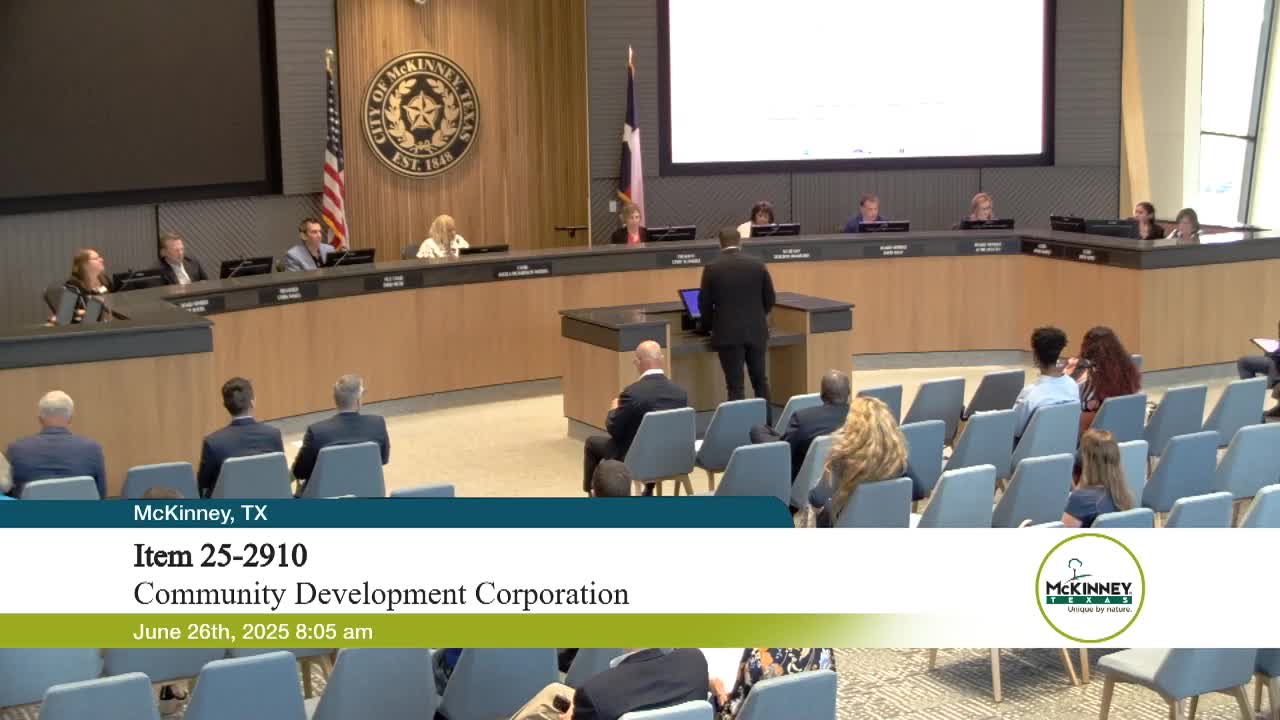City Manager Grimes discusses May finances and Juneteenth celebration highlights
June 26, 2025 | McKinney, Collin County, Texas
This article was created by AI summarizing key points discussed. AI makes mistakes, so for full details and context, please refer to the video of the full meeting. Please report any errors so we can fix them. Report an error »

During the McKinney Community Development Corporation meeting on June 26, 2025, key financial updates and community engagement initiatives were discussed, highlighting the city's economic performance and upcoming budget considerations.
The meeting began with a review of the financial performance for May, marking the eighth month of the fiscal year. Revenues totaled approximately $2.5 million, primarily driven by $2.2 million in sales tax and $300,000 in interest income. Expenditures were relatively low, amounting to around $300,000, which included operational and project expenses. Notably, the sales tax collections showed a 5.9% increase compared to the same period last year, indicating a positive trend despite a recent negative audit collection. This growth aligns McKinney's performance with neighboring cities, suggesting a robust economic outlook as the summer approaches.
City Manager Paul Grimes provided insights into recent developments, including the swearing-in of Mayor Cox and Councilman Ernest Lynch. He emphasized the importance of their orientation session, which covered various city projects and initiatives. Grimes also highlighted the results of a biannual community survey conducted by the city's consultant, Polco. This survey serves as a vital tool for understanding community priorities, particularly in areas such as economic development and parks, which consistently rank high among residents.
The meeting also touched on the upcoming budget season, with $27 million in supplemental requests anticipated from various departments. Grimes noted the challenge of balancing these requests against available funding, with a budget presentation scheduled for August 8. This session will be crucial for determining which projects will receive funding in the upcoming fiscal year.
In conclusion, the discussions at the McKinney Community Development Corporation meeting underscored the city's positive economic indicators and the importance of community engagement through surveys. As the city prepares for budget deliberations, these insights will play a critical role in shaping future development and resource allocation.
The meeting began with a review of the financial performance for May, marking the eighth month of the fiscal year. Revenues totaled approximately $2.5 million, primarily driven by $2.2 million in sales tax and $300,000 in interest income. Expenditures were relatively low, amounting to around $300,000, which included operational and project expenses. Notably, the sales tax collections showed a 5.9% increase compared to the same period last year, indicating a positive trend despite a recent negative audit collection. This growth aligns McKinney's performance with neighboring cities, suggesting a robust economic outlook as the summer approaches.
City Manager Paul Grimes provided insights into recent developments, including the swearing-in of Mayor Cox and Councilman Ernest Lynch. He emphasized the importance of their orientation session, which covered various city projects and initiatives. Grimes also highlighted the results of a biannual community survey conducted by the city's consultant, Polco. This survey serves as a vital tool for understanding community priorities, particularly in areas such as economic development and parks, which consistently rank high among residents.
The meeting also touched on the upcoming budget season, with $27 million in supplemental requests anticipated from various departments. Grimes noted the challenge of balancing these requests against available funding, with a budget presentation scheduled for August 8. This session will be crucial for determining which projects will receive funding in the upcoming fiscal year.
In conclusion, the discussions at the McKinney Community Development Corporation meeting underscored the city's positive economic indicators and the importance of community engagement through surveys. As the city prepares for budget deliberations, these insights will play a critical role in shaping future development and resource allocation.
View full meeting
This article is based on a recent meeting—watch the full video and explore the complete transcript for deeper insights into the discussion.
View full meeting
